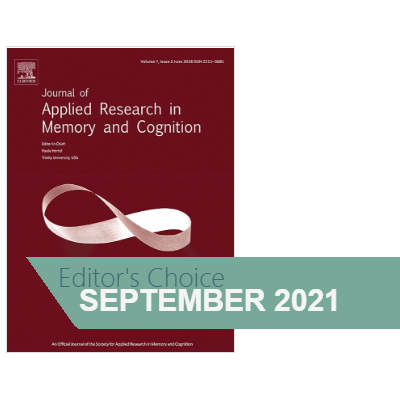JARMAC Editor's Choice: September 2021
/Eyewitness Identification in Its Social Context
AUTHORS: Margaret Bull Kovera & Andrew J. Evelo
Much eyewitness identification research focuses on the cognitive processes underlying witness identification and uses statistical analyses (e.g., ROC) that require data from large numbers of participants to conduct properly. The need for large sample sizes led many eyewitness researchers to conduct studies on internet platforms, which limit their ability to investigate the effect of social influence on identification accuracy. We argue that a consideration of social context effects is required to fully explore the reliability of witness identifications and propose several avenues for future research.
“It Won’t Happen to Us”: Unrealistic Optimism Affects COVID-19 Risk Assessments and Attitudes Regarding Protective Behaviour
AUTHORS: Sinué Salgado & Dorthe Berntsen
People are unrealistically optimistic when assessing their own risk for contracting a disease—or when evaluating other negative future outcomes. In two studies, we examine how unrealistic optimism may affect people’s risk assessments of COVID-19 infection and their attitudes regarding behaviours intended to protect against contagion. We show that people believed that they and their close relatives were less likely to carry or contract COVID-19 and more likely to engage in protective behaviours than an acquaintance. The findings provide a deeper understanding of the cognitive biases influencing risk assessments and compliance with COVID-19 protective behaviours.
Contextualized Knowledge Reduces Misconceived COVID-19 Health Decisions
AUTHORS: Grace Murray, Christopher J. Willer, Tracy Arner, Jennifer M. Roche & Bradley J. Morris
Prior knowledge influences our decisions, potentially creating implicit cognitive conflict with new, correct information. This study examines how people’s health-specific knowledge (e.g., understanding mask efficiency) and their personal context (e.g., outbreak proximity) influence their COVID-19 health decisions. The results suggest that the more relevant knowledge individuals had, the easier it was for them to make decisions in line with updated Center for Disease Control and Prevention guidelines. These findings provide evidence for a more effective way for experts to combat non-adherence due to conflicting health information.
Deception and Lie Detection in the Courtroom: The Effect of Defendants Wearing Medical Face Masks
AUTHORS: Aldert Vrij & Maria Hartwig
During the COVID-19 pandemic, defendants, witnesses, and legal professionals may wear medical face masks, or courtroom proceedings may take place virtually. In this article, we discuss how these deviations from normal procedures may affect jurors’ lie detection ability and decision-making. Drawing on the extensive deception detection literature, we conclude that medical face mask-wearing or virtual courtroom proceedings will not hamper jurors’ lie detection abilities. Instead, jurors may become better at detecting deception when masks are worn if they pay more attention to speech content as a result.


